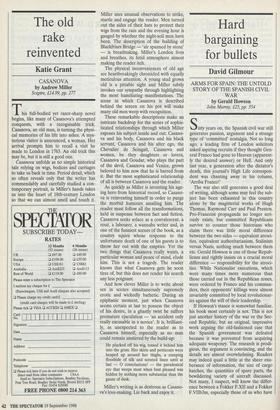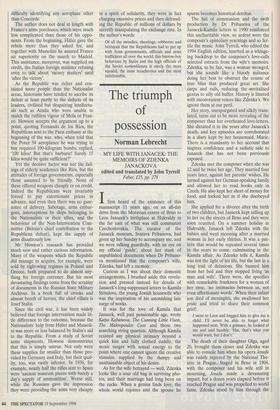Hard bargaining for bullets
David Gilmour
ARMS FOR SPAIN: THE UNTOLD STORY OF THE SPANISH CIVIL WAR by Gerald Howson John Murray, £25, pp. 354 Sixty years on, the Spanish civil war still generates passion, argument and a strange type of 'committed' nostalgia. Not so long ago, a leading firm of London solicitors asked aspiring recruits if they thought Gen- eral Franco had gone to Heaven (apparent- ly the desired answer) or Hell. And only last year, a generation after the dictator's death, this journal's High Life correspon- dent was chanting away in his column, `Arriba Franco!'
The war also still generates a good deal of writing, although some may feel the sub- ject has been exhausted in this country alone by the magisterial works of Hugh Thomas, Raymond Carr and Paul Preston. Pro-Francoist propaganda no longer seri- ously exists, but committed Republicans survive to counter those historians who claim there was little moral difference between the two sides — equivalent atroci- ties, equivalent authoritarianism, Stalinists versus Nazis, nothing much between them etc. Gerald Howson is one of those Repub- licans and rightly insists on a crucial moral difference — responsibility for the atroci- ties. While Nationalist executions, which were many times more numerous than those carried out in the Republican zones, were ordered by Franco and his comman- ders, their opponents' killings were almost invariably committed by local revolutionar- ies against the will of their leadership.
If Howson's stance is somewhat familiar, his book most certainly is not. This is not just another history of the war or the Sec- ond Republic, but an original, impressive work arguing the old-fashioned case that the Spanish government was defeated because it was prevented from acquiring adequate weaponry. The research is prodi- gious, the argument is convincing, and the details are almost overwhelming. Readers may indeed quail a little at the sheer exu- berance of information, the size of cargo hatches, the quantities of spare parts, the bewildering variety of aircraft discussed. Not many, I suspect, will know the differ- ence between a Fokker F.XII and a Fokker F.VIIb3m, especially those of us who have difficulty identifying any aeroplane other than Concorde.
The author does not deal at length with Franco's arms purchases, which were much less complicated than those of his oppo- nents. From the beginning, Hitler gave the rebels more than they asked for, and together with Mussolini he assured Franco air superiority on the march to Madrid. This assistance, moreover, was supplied on credit, the Italian foreign minister refusing even to talk about 'money matters' until `after the victory'.
As the Republic was richer and con- tained more people than the Nationalist areas, historians have tended to ascribe its defeat at least partly to the defects of its leaders, civilised but despairing intellectu- als such as Azaria who were unable to match the ruthless vigour of Mola or Fran- co. Howson accepts the argument up to a point, quoting Fernando de los Rios, the Republican sent to the Paris embassy at the beginning of the war, who, when told that the Potez 54 aeroplanes he was trying to buy required 100-kilogram bombs, replied, `100 kilos! But that's barbaric! Surely 15 kilos would be quite sufficient?'
Yet the decisive factor was not the fail- ings of elderly academics like Rios, but the attitudes of foreign governments, especially those assumed to be friendly. None of these offered weapons cheaply or on credit. Indeed the Republicans were invariably forced to pay extortionate prices in advance, and even then there was no guar- antee of delivery. Sabotage, arms embar- goes, interceptions by ships belonging to the Nationalists or their allies, and the behaviour of the Non-Intervention Com- mittee (Britain's chief contribution to the Republican defeat), kept the supply of arms disastrously low.
Mr Howson's research has provided much new and rather curious information. Many of the weapons which the Republic did manage to acquire, for example, were sold by right-wing regimes in Poland and Greece, both prepared to do almost any- thing for foreign currency. But his most devastating findings come from the scrutiny of documents in the Russian State Military Archives. In a book full of crooks and almost bereft of heroes, the chief villain is Josef Stalin.
Since the civil war, it has been widely believed that foreign intervention made lit- tle difference to the outcome, because the Nationalists' help from Hitler and Mussoli- ni was more or less balanced by Stalin's aid to the Republic. From a study of Soviet arms shipments, Howson demonstrates that this is simply untrue. Not only were these supplies far smaller than those pro- vided by Germany and Italy, but their qual- ity, too, was vastly inferior. In 1936, for example, nearly half the rifles sent to Spain were 'ancient museum pieces with barely a day's supply of ammunition'. Worse still, while the Russians gave the impression they were providing the arms very cheaply in a spirit of solidarity, they were in fact charging excessive prices and then defraud- ing the Republic of millions of dollars by secretly manipulating the exchange rate. In the author's words:
Of all the swindles, cheatings, robberies and betrayals that the Republicans had to put up with from governments, officials and arms traffickers all over the world, this barrow-boy behaviour by Stalin and the high officials of the Soviet nomenklatura is surely the most squalid, the most treacherous and the most indefensible.











































































 Previous page
Previous page